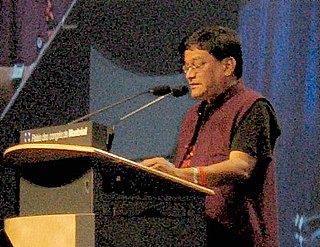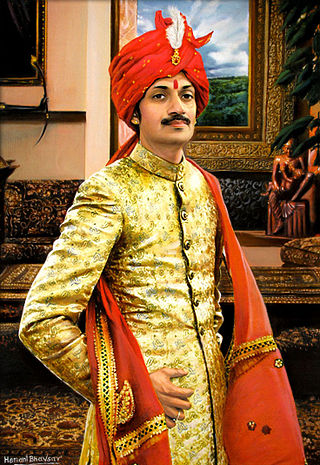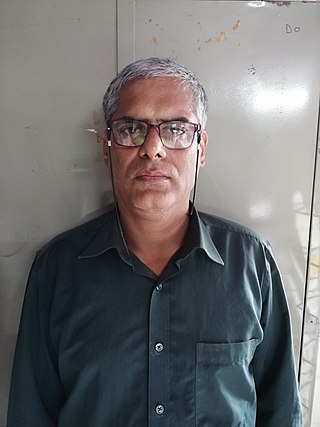Related Research Articles

Ashok Row Kavi is an Indian journalist and LGBT rights activist.

The Pink Mirror, titled Gulabi Aaina in India, is an Indian film drama produced and directed by Sridhar Rangayan. It is said to be the first Indian film to comprehensively focus on Indian transsexuals with the entire story revolving around two transsexuals and a gay teenager's attempts to seduce a man, Samir. The film explores the taboo subject of transsexuals in India which is still much misunderstood and ridiculed.

Manvendra Singh Gohil is an Indian prince, being the son and probable heir of the honorary Maharaja of Rajpipla. He is considered to be the first openly gay prince in the world, and he is known for being one of India's foremost LGBT activists. He runs a charity, the Lakshya Trust, which works with the LGBT community.

Sridhar Rangayan is an Indian filmmaker who has made films with special focus on queer subjects. His queer films, The Pink Mirror, Yours Emotionally, 68 Pages, Purple Skies, Breaking Free & Evening Shadows have been considered groundbreaking because of their realistic and sympathetic portrayal of the largely closeted Indian gay community. His film The Pink Mirror remains banned in India by the Indian Censor Board because of its homosexual content.

Lesbian, gay, bisexual, transgender, and queer (LGBTQ) rights in India have expanded in the 21st century, though much of India's advancements on LGBT rights have come from the judiciary and not the legislature. LGBTQ people in India continue to face legal and social challenges not experienced by non-LGBTQ people. There are no legal restrictions against gay sex within India. Same-sex couples have some limited cohabitation rights, colloquially known as live-in relationships. However, India does not currently provide for common-law marriage, same-sex marriage, civil union or unregistered cohabitation.
The Naz Foundation (India) Trust is a non-governmental organisation (NGO) in that country that works on HIV/AIDS and sexual health. It is based in the Indian capital of New Delhi.
The KASHISH Pride Film Festival is an annual LGBTQ event that has been held in Mumbai, India, since 2010. The film festival screens gay, lesbian, bisexual, transgender and queer films from India and around the world. It is voted as one of the top five LGBT film festivals in the world.

LGBTQ people are well documented in various artworks and literary works of Ancient India, with evidence that homosexuality and transsexuality were accepted by the major dharmic religions. Hinduism and the various religions derived from it were not homophobic and evidence suggests that homosexuality thrived in ancient India until the medieval period. Hinduism describes a third gender that is equal to other genders and documentation of the third gender are found in ancient Hindu and Buddhist medical texts. The term "third gender" is sometimes viewed as a specifically South Asian term, and this third gender is also found throughout South Asia and East Asia.
Pune Pride is an annual LGBT pride parade that was first held in Pune, Maharashtra on 11 December 2011. It is the second Pride parade to be organized in the state of Maharashtra, after the Queer Azaadi Mumbai Pride March.

India has a long and ancient tradition of culture associated with the LGBTQ community, with many aspects that differ markedly from modern liberal western culture.
Aditya Bandopadhyay is a lawyer and LGBTQ rights activist in India, helping to challenge anti-sodomy laws, establishing advocacy organizations and providing legal services to HIV/AIDS organizations.
Humsafar Trust is an NGO in Mumbai that promotes LGBT rights. Founded by Ashok Row Kavi, Suhail Abbasi, and Sridhar Rangayan in 1994, it is one of the largest and most active of such organisations in India. It provides counselling, advocacy and healthcare to LGBT communities and has helped reduce violence, discrimination and stigma against them. Humsafar Trust is the convenor member of Integrated Network for Sexual Minorities (INFOSEM).
This is a timeline of notable events in the history of non-heterosexual conforming people of South Asian ancestry, who may identify as LGBTIQGNC, men who have sex with men, or related culturally-specific identities such as Hijra, Aravani, Thirunangaigal, Khwajasara, Kothi, Thirunambigal, Jogappa, Jogatha, or Shiva Shakti. The recorded history traces back at least two millennia.
Chennai has LGBTQIA cultures that are diverse concerning- socio-economic class, gender, and degree of visibility and politicisation. They have historically existed in the margins and surfaced primarily in contexts such as transgender activism and HIV prevention initiatives for men having sex with men (MSM) and trans women (TG).

The Chandigarh LGBTQ Pride Walk is an annual march held as part of the "Garvotsava" pride week celebrations in Chandigarh, the capital city of the northern Indian states of Punjab and Haryana. The event aims to celebrate and bring together the LGBTQ community and its supporters.
Tamil sexual minorities are Tamil people who do not conform to heterosexual gender norms. They may identify as LGBTQIA. It has been estimated that India has a population of 2.5 million homosexuals, though not all of them are Tamil, and not all Tamils live in India.
The following list is a partially completed compilation of events considered to have a profound effect on the welfare or image of Tamil sexual minorities. The use of bold typeface indicates that the event is widely considered to be landmark:

Gay Bombay is an LGBTQ social organization in Mumbai, India, which promotes LGBT rights. It was founded in 1998. The organization works to create an awareness of gay rights through workshops, film screenings, and parties. The organisation aims to create a safe space for the LGBT community.

Bindumadhav Khire is an LGBTQ+ rights activist from Pune, Maharashtra, India. He runs Samapathik Trust, an NGO which works on LGBTQ+ issues in Pune district. He founded Samapathik Trust in 2002 to cater the men having sex with men (MSM) community in Pune city. He has also written on the issues on sexuality in fictional and non-fictional forms including edited anthologies, plays, short-stories, and informative booklets.
References
- 1 2 3 Dore, Bhavya. "For LGBT community, the internet can't quite replace magazine culture". Scroll.in. Retrieved 2019-03-13.
- 1 2 3 4 5 6 7 Staff, Pacific Standard. "The Rise, Fall, and Resurrection of India's Oldest Surviving LGBT Magazine". Pacific Standard. Retrieved 2019-03-13.
- 1 2 3 KASHISHfilmfest (2016-06-01), Bombay Dost launch , retrieved 2019-03-13
- 1 2 3 4 "India's First Gay Magazine Struggles to Survive". Wall Street Journal. 2014-02-03. ISSN 0099-9660 . Retrieved 2019-03-13.
- ↑ "INDIA'S LGBT AND HIV HERO ASHOK ROW KAVI RECEIVED SPECIAL PRIZE AT ASIA PACIFIC COMMUNITY SERVICE AWARDS". m.facebook.com. Retrieved 2019-03-13.
- ↑ admin. "About Us – Humsafar Trust" . Retrieved 2019-03-13.
- ↑ "The Humsafar Trust India". AIDSDataHub.
- 1 2 "Bombay Dost India s first LGBT magazine turns 25". Mid-day. 6 October 2015. Retrieved 2019-03-13.
- 1 2 "India's first gay magazine relaunches after seven years". DAWN.COM. 2009-05-16. Retrieved 2019-03-13.
- 1 2 admin. "Likho – Humsafar Trust" . Retrieved 2019-03-13.
- 1 2 Prakash, Pranay (2018-12-15). "Likho Awards honours LGBTQ representation in media". The Hindu. ISSN 0971-751X . Retrieved 2019-03-13.
- ↑ "Bombay Dost Turns 20:Special Edition On Sale". 2011-08-13.
- ↑ "Bombay Dost 2013 | Queer Ink" . Retrieved 2019-03-13.
- ↑ "Woah! Manoj Bajpayee is the cover boy of Bombay Dost, India's first LGBTQ magazine". Bollywood Bubble. 2016-08-28. Retrieved 2019-03-13.
- ↑ "Celina Jaitley At Bombay Dost gay magazine Launch". Bollyone.com. 2009-04-17. Retrieved 2019-03-13.